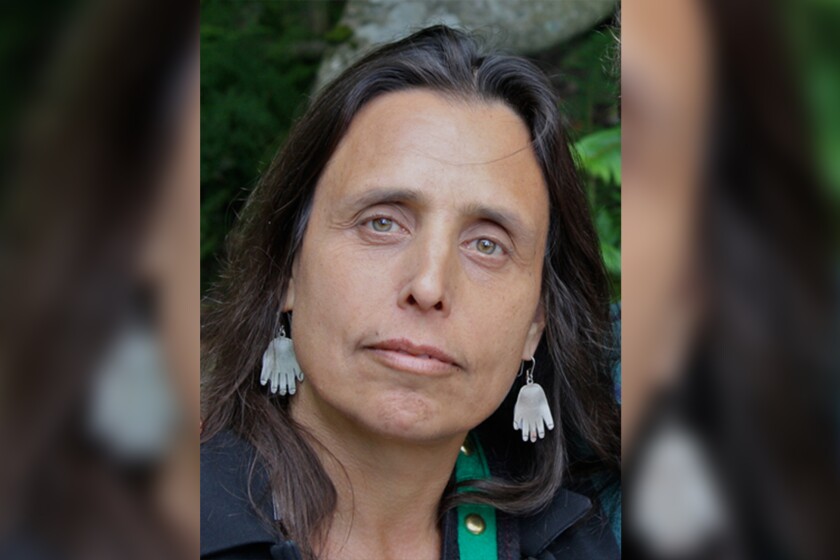The Pimicikamak Cree Nation in northern Manitoba is choking on smoke as fires rage through the territories, with thousands trying to escape the worst fires in history.
The skies are filled with smoke, and the sun has been red for days. It’s an inescapable feeling of terror. It’s in our DNA to be fearful of catastrophe. As air particulates drift to our land, Detroit Lakes and Grand Marais set records for poor air quality, we go outside masked or not at all. We are closer than we think. We are the same rivers, Canadian tar sands oil moves through our lands. And, some of our electricity comes from this very community. The price is high.
ADVERTISEMENT
"Many that couldn't get out because the junction at Highway 374 and Highway 373 is their lifeline to Norway House, and now it's being compromised by the fire and the smoke," Terrifying.
Pimicikamak is Cree territory in the north; Cross Lake, it’s called. The word refers to a current crossing the lake. It’s the same word as Bemidji, or Bemdjigaamag. The lake with a cross current. As I write, the airport is closed, roads and rivers compromised. Residents were being flown out from the bush airport, about 530 kilometers north of Winnipeg. But high winds and dry conditions worsened the situation and flights were canceled without notice, just as Chief Monias issued a full evacuation order, telling the remaining 6,500 residents of the territory to head south to Norway House Cree Nation. That’s another community under an evacuation notice.
While the media treats the raging fires as sort of annual horror show, the background to these times has been building. Pimicikamak's traditional territory is the upper Nelson River watershed, Kichi Sipi (Cree for Great River, or Mississippi). It drains the fourth-largest watershed in North America: Lake Winnipeg, the seventh largest lake in North America, and two of the continent’s largest rivers.
There’s been a long assault on the integrity of that ecosystem, with Minnesotans some of the primary beneficiaries. What am I talking about? Manitoba Hydro and the mega dams.
Hydro electric power has been misrepresented as clean energy, but that’s a matter of scale. Drowning entire ecosystems under water, creating wastelands of dead trees, and receding shorelines, silting and clogging dams till they are inefficient. Ecologically, the extensive boreal shoreline ecosystem nourishes the vast forests of the north, and that destruction has a large ripple for the boreal forest.
The boreal forest is an ecological stronghold remaining in North America. It is the northern lung of the planet, covering 40% of Canada’s land mass (and part of it is in Russia). It may be as important as the world’s rainforests (the other lung) in producing oxygen and absorbing greenhouse gases. The boreal forest is now the most threatened of all major landscapes on our planet, according to William Pruitt, University of Manitoba professor.
In Manitoba alone, hydroelectric development has resulted in the flooding or clearing of roughly 600,000 acres of boreal forest. That is roughly 10 times the area lost to clear-cutting in Canada annually. In addition, an unknown area of forest is lost each year as destabilized land is dumped into rivers and lakes by erosion, Pruitt explains. Canada is the world’s largest producer of hydroelectricity. The people who are dammed are Indigenous — a way of life buried under huge dams.
ADVERTISEMENT
Who has benefited? That would be us. The north has dams, and the powerlines go south. That’s what an energy colony looks like, and money is to be made. One of the largest contracts with Manitoba Hydro is with Xcel Energy. That, however, is about to change. Between Donald Trump’s trade war with Canada and a visionary premier of Manitoba, Wab Kinew (the province’s first Anishinaabe premier), the Xcel contracts will not be renewed. On April 14, Kinew announced that Manitoba Hydro would not renew two contracts totaling 500 megawatts of power capacity to Xcel. Instead, Manitoba has decided to export power to Nunavut, a largely Indigenous province further north.
One more point. These fires are the direct result of fossil fuel combustion. Between Canada’s dirty tar sands and Enbridge, there’s an ecological mess being made.
Far away, those fires, but the smoke is in my lungs, scorches my throat, and my primal fears are at an all-time high. Pimicikamik, I pray for you. I pray for us all.









